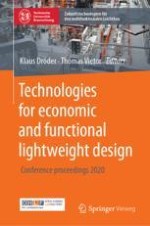2021 | OriginalPaper | Buchkapitel
Design of Additively Manufactured Heat-Generating Structures
verfasst von : Karl Hilbig, Hagen Watschke, Thomas Vietor
Erschienen in: Technologies for economic and functional lightweight design
Verlag: Springer Berlin Heidelberg
Aktivieren Sie unsere intelligente Suche, um passende Fachinhalte oder Patente zu finden.
Wählen Sie Textabschnitte aus um mit Künstlicher Intelligenz passenden Patente zu finden. powered by
Markieren Sie Textabschnitte, um KI-gestützt weitere passende Inhalte zu finden. powered by
